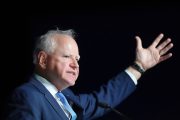The New York Times reported on January 7: "Mr. Panetta’s lack of experience had drawn the sharpest criticism on Monday from Senator Dianne Feinstein, a Democrat who is chairwoman of the Senate Intelligence Committee and whose career in California politics tracked closely with Mr. Panetta’s for years. After hearing directly from both Mr. Obama and Vice President-elect Joseph R. Biden Jr. on [January 6], Mrs. Feinstein seemed to soften her opposition slightly, but she did not indicate whether she would vote to confirm Mr. Panetta."
Senator Feinstein complained publicly about the fact that, as chairwoman of the Intelligence Committee, she had not been informed about Panetta’s appointment in advance and voiced skepticism about the wisdom of the choice. She reportedly expressed misgivings about Panetta not being "an intelligence professional."
"I know nothing about this, other than what I’ve read," said Feinstein in a statement reported by AFP. "My position has consistently been that I believe the [CIA] is best-served by having an intelligence professional in charge at this time."
Vice President-elect (and still Senator) Joe Biden phoned Feinstein to apologize on behalf of the incoming administration and told reporters in the Capitol: "I’m still a Senate man, and I always think this way. I think it’s always good to talk to the requisite members of Congress."
With some ruffled feathers apparently soothed, support for Panetta among senators seemed to be building just two days after the news was released. An article carried by Yahoo! News written by Glenn Thrush of Newsday‘s Washington Bureau and John Bresnahan, the capitol bureau chief of Politico, said that at least five members of the Senate Intelligence Committee were backing Panetta. Among these is Sen. Bill Nelson (D-Fla.), a member of the Intelligence Committee, who said in an interview, "Leon is a personal friend of mine. He is eminently qualified and capable to do any job in the U.S. government, including head of the CIA, so I support him."
"Where the incoming administration goofed," continued Nelson, "was they should have reached out as a courtesy to the [chairwoman] of the Intelligence Committee. We have been so frustrated with the Bush administration and their unwillingness to be open and transparent for us to do our oversight job on intelligence. I think Dianne expected better of the new administration."
The coverage of the Panetta selection found in most media, however, does little to shed substantial light on the former chief of staff’s makeup. While it is acknowledged by supporters and critics alike that Panetta has no experience within our nation’s intelligence community, some regard that characteristic as a plus. Former Representative Lee Hamilton (D.-Ind.), who once co-chaired the government’s 9/11 Commission and now heads the Woodrow Wilson Center in Washington, said of his former House colleague in a statement reported by AFP: "He will be an outsider and I think the president wants an outsider’s perspective on the CIA, I think Leon is a superb appointment. I’ve worked with him for decades. He’s exceedingly bright, he’s always well-informed."
Another member of the Senate Intelligence Committee, Russ Feingold, (D.-Wisc.), was quoted in the New York Times as stating that Panetta would offer "fresh leadership." Feingold said he hoped Panetta would "restore the rule of law after years of lawlessness" — an apparent reference to U.S. intelligence agencies having engaged in harsh interrogation techniques and warrantless wiretaps during the Bush administration.
A review of Leon Panetta’s career from even before the time he served in the House, however, indicates that the California Democrat was most likely selected because his very liberal political record is in harmony with the new administration’s objectives.
Panetta began his career in politics in 1966 as a legislative assistant to Senator Thomas Kuchel (R.-Calif.), the Senate’s Minority Whip, whom Panetta has called "a tremendous role model." Kuchel made himself a champion of the liberal Rockefeller wing of the Republican Party, when on May 2, 1963, he delivered a scathing speech in the Senate directed against conservative, anti-communist Americans, whom he labeled as "fright peddlers."
Panetta served as the assistant to Richard Nixon’s Secretary of Health, Education, and Welfare. Robert H. Finch, becoming the Director of the Office for Civil Rights. Apparently fining the Nixon administration to be too "conservative" for his tastes, Panetta resigned in 1970 to work as executive assistant for New York Mayor John Lindsay, who had been elected on a joint Republican and Liberal party ticket.
Panetta became a Democrat in 1971 and practiced law until 1976, when he was first elected to the House. During his 16-year career in the House, Panetta achieved abysmally low scores in The New American magazine’s "Conservative Index" (now called the "Freedom Index"). With 100 percent being a perfect constitutionalist score, Panetta’s rarely scored above the low teens and sometimes fell to zero. This put him in the company of some of the House’s most committed Leftists, such as Barney Frank, John Conyers, Barbara Boxer, and Ronald Dellums.
In April 1985 Panetta joined with 13 of his leftist congressional colleagues — including Ron Dellums, Don Edwards, George Miller, Christopher Dodd, and Les Aspin — in sponsoring a 20th anniversary fund-raising gala for the pro-Marxist Institute for Policy Studies (IPS), which had been described by Brian Crozier, director of the London Institute for the Study of Conflict, as the "perfect intellectual front for Soviet activities which would be resisted if they were to originate openly from the KGB." The IPS was originally funded with millions of dollars from the Faberge perfume magnate and Communist Party member Samuel Rubin and his wife.
On April 30, 1987, Rep. Panetta cast a highly suspect vote for one who would direct our nation’s top foreign intelligence agency. On that day, he was one of 183 members of the House to vote against the withdrawal of Most Favored Nation (MFN) status for communist Romania. Romania, at the time, was run by Nicolae Ceausescu, one of the most brutal dictators in the entire Soviet bloc.
Anti-communist publisher Phillip Abbott Luce started the hard-hitting newsletter The Pink Sheet on the Left to expose communist and other organizations or individuals working to increase the size and power of government. After the election of Ronald Reagan in 1980, Luce changed the name of the newsletter to The American Sentinel, and changed the publication’s emphasis to geo-strategic issues. However, beginning with the February 15, 1993 issue, the biweekly newsletter became The Pink Sheet on the Left again. Editor Lee Bellinger explained his reason for the change, "Consider 10 good reasons why we brought The Pink Sheet on the Left out of retirement: Bill Clinton, Hillary Clinton, Strobe Talbott, Albert Gore, Ronald Dellums, Donna Shalala, Ron Brown, Lawrence Walsh, Leon Panetta, and Warren Christopher." (Emphasis added.)
Readers who recall the movement to impeach Bill Clinton remember that one of the charges raised by Clinton’s critics was the conflict of interest created when individuals connected with the Chinese Overseas Shipping Company (COSCO) — such as John Huang, Charles Trie, and James and Mochtar Riady — helped funnel contributions to the Clinton reelection campaign. Afterwards, the Clinton administration lobbied for granting COSCO a 10-year lease on the former Long Beach Naval Shipyard in California. During a March 1997 edition of CNBC’s Equal Time program, California Republican State Senator Dick Mountjoy noted that COSCO-linked arms dealer Wang Jun had been granted personal access to President Clinton, and that Wang’s business associates had smuggled illegal assault weapons into California for delivery to street gangs by making use of a ship owned and operated by COSCO. Mountjoy then stated:
The next thing you know, [then-Chief of Staff] Leon Panetta is down here negotiating that port for the Chinese. [Emphasis added.]
There is much more to the COSCO-Long Beach connection than we have room for here, but a good summary of the threat the arrangement made to U.S. security may be found in an item inserted into the Congressional Record by Rep. Gerald B.H. Solomon on May 20, 1997.
Even the most unbiased of observers may legitimately ask: Why on Earth is an individual who helped negotiate the turnover of the Long Beach Naval Shipyard to the communist Chinese, thereby creating the threat to U.S. national security described in the Washington Times article by Rowan Scarborough and inserted into the Congressional Record by Rep. Solomon, being considered for a top position at one of our nation’s most critical intelligence agencies?
Notice that Scarborough observed: "The Clinton administration seems to be going out of its way to help the most serious threat to American security, the so-called People’s Republic of China."
With so many Clinton administration staffers — including Leon Panetta — being recycled by Mr. Obama, can this administration be any different?
Photo: AP Images




